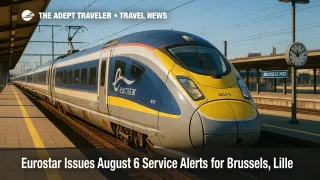Eurostar Issues August 6 Service Alerts for Brussels, Lille

Eurostar is warning passengers of fresh August 6 delays at Brussels-Midi/Zuid and Lille-Europe, while also flagging the upcoming cancellation of trains 9149 and 9152 on the Belgian network. Travelers bound for or connecting through the affected hubs should build in extra time, document any out-of-pocket costs, and keep hotel or taxi receipts for possible reimbursement under EU 261. The Adept Traveler began life as an accessible-travel agency, so we applaud clear, timely alerts that help all riders adjust plans quickly.
Key Points
- Why it matters: Same-day Eurostar journeys risk knock-on delays and missed connections.
- Travel impact: Two peak-hour services on the Belgian network are cancelled later this month.
- What's next: Eurostar will update its live page throughout the day; compensation claims may follow.
- Passengers should retain receipts for hotels, meals, taxis, or new tickets.
- EU 261 rules cover rail delays of 60 minutes or more departing an EU station.
Snapshot
Live updates posted at 05:54 a.m. local time cite "operational issues" at Lille-Europe and a separate late-running arrival at Brussels-Midi. Eurostar expects residual delays across northbound and southbound services until schedules can realign. Although today's alerts do not cancel trains, they coincide with advance warnings that engineering works will scrub trains 9149 and 9152 from August 16 to 31. Travelers booked on those departures may request a free exchange or full refund. Eurostar reminds riders to check real-time status before leaving home and to subscribe to SMS notifications for gate changes.
Background
Brussels-Midi/Zuid is Eurostar's second-busiest continental hub, funnelling London-Amsterdam and London-Cologne traffic through Belgium's capital. Lille-Europe, 35 minutes south of Brussels by high-speed rail, serves as a strategic interchange between French TGV, Thalys, and Eurostar networks. Both stations have seen recurring summer disruptions tied to cross-border engineering works and tight turnaround schedules. EU 261-formally Regulation 1371/2007-extends compensation rights to international rail passengers departing an EU station; payouts range from 25 percent to 100 percent of the ticket price depending on the length of delay. Proof of expenses such as hotel nights or taxi fares strengthens claims when carriers do not offer on-the-spot assistance.
Latest Developments
Delays Mount as Belgian Hub Bottlenecks
By mid-morning, Eurostar reported multiple cascaded delays of 20 to 45 minutes out of Brussels-Midi and Lille-Europe. Staff on the platform attribute today's holdup to a late inbound train that overloaded the single spare platform slot during peak crossover, forcing subsequent departures to queue for clearance. Although no additional cancellations are scheduled for August 6, travelers with onward Thalys or SNCF tickets risk missing fixed-time reservations. Eurostar's service-update page advises passengers to "arrive early, remain near the departure boards, and expect crowd-management measures at the ticket gates." The carrier adds that e-ticket barcodes will remain valid on any later train the same day, subject to available seats.
Analysis
Summer engineering windows in Belgium and northern France routinely compress Eurostar's margin for operational recovery, especially at stations sharing platforms with domestic services. Today's delays underscore three persistent vulnerabilities. First, Brussels-Midi's platform geometry restricts simultaneous arrivals, so a single late train ripples through the grid. Second, Lille-Europe lacks a dedicated Eurostar siding, meaning international sets must wait while regional TER units clear. Third, peak-season load factors exceed 90 percent, leaving scant empty seats for disrupted travelers. EU 261 pushes carriers toward swift re-routing or reimbursement, yet the claims process still hinges on passenger paperwork. Early communication via the Eurostar app, plus on-site staff empowered to distribute meal vouchers, could mitigate hardship for families and mobility-impaired riders. Long-term, infrastructure upgrades such as an additional through-track at Brussels-Midi would provide the operational resilience that modern high-frequency timetables demand.
Final Thoughts
If you are riding Eurostar today, build an extra hour into any onward itinerary, photograph departure boards, and store taxi or hotel receipts in a single envelope. Should delays top 60 minutes, submit an EU 261 claim through Eurostar's web portal within three months. The modest effort can recoup unexpected costs and signals to carriers that transparent communication is essential. Staying informed and organized remains the traveler's best defense against sudden rail disruptions, especially when Eurostar service alerts surface without much warning-just like today's Eurostar service alerts.
